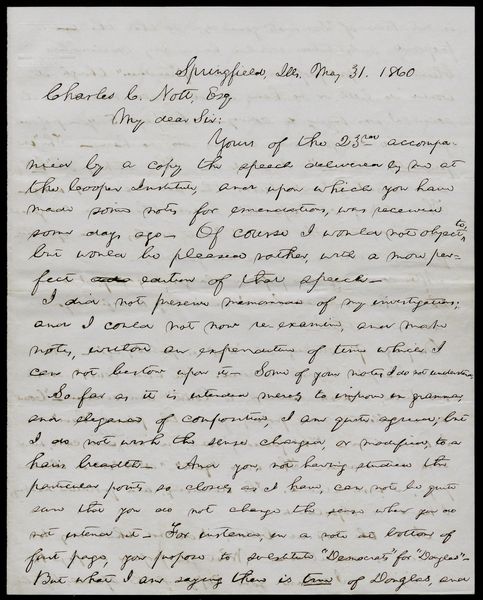Lincoln, Abraham (1809-1865) to Charles C. Nott re: publishing Cooper Institute address (for 1860 election)
High-resolution images are available to schools and libraries via subscription to American History, 1493-1943. Check to see if your school or library already has a subscription. Or click here for more information. You may also order a pdf of the image from us here.
A high-resolution version of this object is available for registered users. LOG IN
Gilder Lehrman Collection #: GLC04436.01 Author/Creator: Lincoln, Abraham (1809-1865) Place Written: Springfield Type: Autograph letter signed Date: 1860/05/31 Pagination: 3 p. ; 25 x 19.8 cm Order a Copy
Lincoln's letter to Nott concerning the Nott-Brainerd edition of the Cooper Institute address. While gracious for the time they have spent in correcting and annotating his speech, Lincoln is quite adamant that the speech is not to be altered so as to misrepresent his position. "So far as it is intended merely to improve on grammar, and elegance of composition, I am quite agreed; but I do not wish the sense changed, or modified, to a hairs breadth. And you, not having studied the particular points so closely as I have, can not be quite sure that you do not change the sense when you do not intend it." This document differs from the copy printed in Basler's edition of the Collected Works.
Basler, Roy P. The Collected Works Of Abraham Lincoln. (New Brunswick, NJ: Rutgers University Press, 1953), Vol. IV 1860 - 1861,
p. 58 - 59.
Springfield, Ills. May 31. 1860
Charles C. Nott, Esq.
My dear Sir:
Yours of the 23rd accompanied by a copy [of] the speech delivered by me at the Cooper Institute, and upon which you have made some notes for emendation, was received some days ago. Of course I would not object [inserted above: to] but would be pleased rather, with a more perfect [strikeout] edition of that speech.
I did not preserve memoranda of my investigations; and I could not now re-examine, and make notes, without an expenditure of time which I can not bestow upon it. Some of your notes I do not understand.
So far as it is intended merely to improve on grammar, and elegance of composition, I am quite agreed; but I do not wish the sense changed, or modified, to a hairs breadth. And you, not having studied the particular points so closely as I have, can not be quite sure that you do not change the sense when you do not intend it. For instance, in a note at bottom of first page, you propose to substitute "Democrats" for "Douglas." But what I am saying then is true of Douglas, and [2] is not true of "Democrats" generally; so that the [strikeout] proposed substitution would be a very considerable blunder. Your proposed insertion of "residences" though it would do little, or no harm, is not at all necessary to the sense I was trying to convey. On page 5 your proposed gramatical change, would certainly do no harm. The "impudently absurd" I stick to. The striking out "he" and inserting "we" turns the sense exactly wrong. The striking out "upon it" leaves the sense too general and incomplete. The sense is "act as they acted upon that question", not as they acted generally.
After considering your proposed changes on page 7. I do not think them material, but I am willing to defer to you in relation to them.
On page 9. striking out "to us" is probably right. The word "lawyer's" I wish retained. The word "Courts" struck out twice, I wish reduced to "Court" and retained. "Court" as a collective noun properly governs the plural "have" as I understand. "The" preceding "Court," in the [struck: last] [inserted: latter] case, must also be retained. The words "quite" "as" & "or" on the same page, I wish retained. The italicizing, and quotation marking, I have no objection to.
As to the note at the bottom, I do not think any too much is admitted. What you propose on page 11 is right. I return your copy of the speech, together [3] with one printed here, under my own hasty supervising. That at New York was printed without any supervision by me. If you conclude to publish a new edition, allow me to see the proof -sheets.
And now thanking you for your very complimentary letter, and your interest for me generally, I subscribe myself
Your friend & Servant
A. Lincoln
Citation Guidelines for Online Resources
The copyright law of the United States (title 17, United States Code) governs the making of photocopies or other reproductions of copyrighted material. Under certain conditions specified in the law, libraries and archives are authorized to furnish a photocopy or other reproduction. One of these specific conditions is that the photocopy or reproduction is not to be “used for any purpose other than private study, scholarship, or research.” If a user makes a request for, or later uses, a photocopy or reproduction for purposes in excess of “fair use,” that user may be liable for copyright infringement. This institution reserves the right to refuse to accept a copying order if, in its judgment, fulfillment of the order would involve violation of copyright law.
